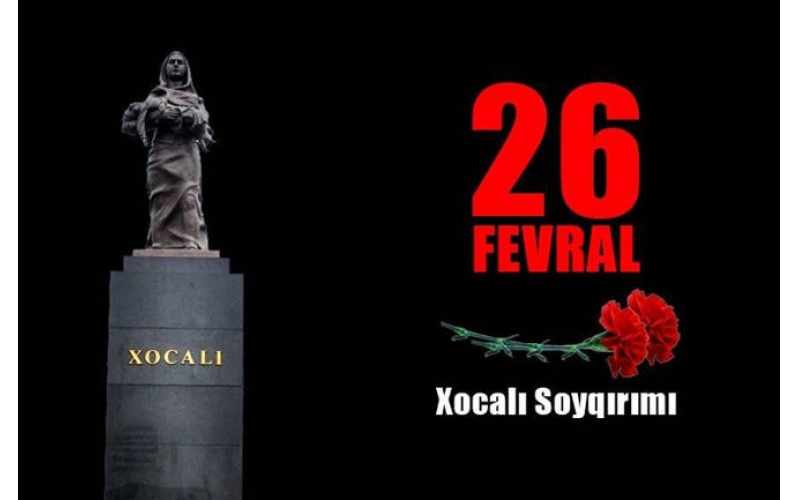
The statement has been addressed to the UN Secretary General, the UN Security Council, the UN High Commissioner for Human Rights, the UN High Commissioner for Refugees, the UN Human Rights Council, the heads of UNICEF, UNESCO, the CE and the EU, the OSCE, international institutions and offices of the European Ombudspersons, the Asian Ombudspersons Association, the OIC and the Association of Ombudspersons of the OIC member countries, the OIC's Independent Permanent Commission on Human Rights, the European Network of Ombudsmen for the Rights of the Child, the International Peace Bureau, ombudspersons and national human rights institutions of various countries, Azerbaijani embassies abroad and foreign embassies in Azerbaijan, Azerbaijani Diaspora organizations.
According to the statement, on the night of February 25-26, 1992 Armenian Armed Forces, gangs of Armenian terrorists and personnel of the former Soviet 366th motorized rifle regiment stationed in Khankendi city committed genocide in Khojaly town of Nagorno-Karabakh region of Azerbaijan.
“During the Khojaly genocide committed 29 years ago, 613 peaceful Azerbaijani residents, including 63 children, 106 women and 70 elderly were killed, 487 people were heavily injured. At the same time, 1,275 residents were taken hostage, of whom 150, including 68 women and 26 children, still got missing,” noted the document. “As a result of the genocide, 8 families were completely exterminated, 25 children lost both, and 130 children - one of their parents. The Khojaly tragedy is yet another example of the policy of occupation and ethnic cleansing directed by Armenian nationalists and their accomplices against the Azerbaijani people."
The document stressed that after the return of national leader Heydar Aliyev to power on his initiative, in 1994 Azerbaijan’s Parliament gave a political and legal assessment of the genocide, and February 26 was declared the ‘Day of the Khojaly genocide’.
According to the Azerbaijani ombudsperson, the international campaign ‘Justice for Khojaly!’, launched by Heydar Aliyev Foundation’s Vice-President Leyla Aliyeva, played a special role in bringing the truth about the genocide and Armenian crimes to the world community. Parliaments of Mexico, Pakistan, Czech Republic, Peru, Colombia, Panama, Honduras, Sudan, Guatemala and Djibouti recognized the massacre in Khojaly as genocide in the adopted documents.
"The parliaments of Romania, Bosnia and Herzegovina, Serbia, Jordan, Slovenia, Scotland, Paraguay, as well as the executive and legislative bodies of 22 US states strongly condemned and assessed the Khojaly tragedy as genocide. The OIC recognized Armenia as an aggressor, and the Khojaly tragedy as genocide," she further said.
The statement also indicated that the Khojaly genocide, which took place in front of the world's states at the end of the 20th century, is a crime committed not only against the Azerbaijani people, but also against humanity. “Unfortunately, despite the fact that 29 years have passed since then, the international community still did not give a proper political and legal assessment of this inhuman act, and the persons who committed this bloody act were not brought to justice,” noted the statement.
“The lack of an adequate response of the world community to the Khojaly genocide is far from morality and unacceptable, because it creates the basis for a commitment of similar crimes in the future," summed up the document.
The Ombudsperson of Azerbaijan called on international organizations and states to recognize the Khojaly massacre as an act of genocide so that the criminals who committed this crime against humanity could be brought to justice.
Views: 292
